Business Taxation Law and Policy
VerifiedAdded on 2023/06/09
|11
|2723
|122
AI Summary
This article discusses the principles of business taxation law and policy in Australia. It covers topics such as input tax credits, GST-free exports, and taxable importations. The article also provides examples and references to relevant taxation rulings and legislation.
Contribute Materials
Your contribution can guide someone’s learning journey. Share your
documents today.
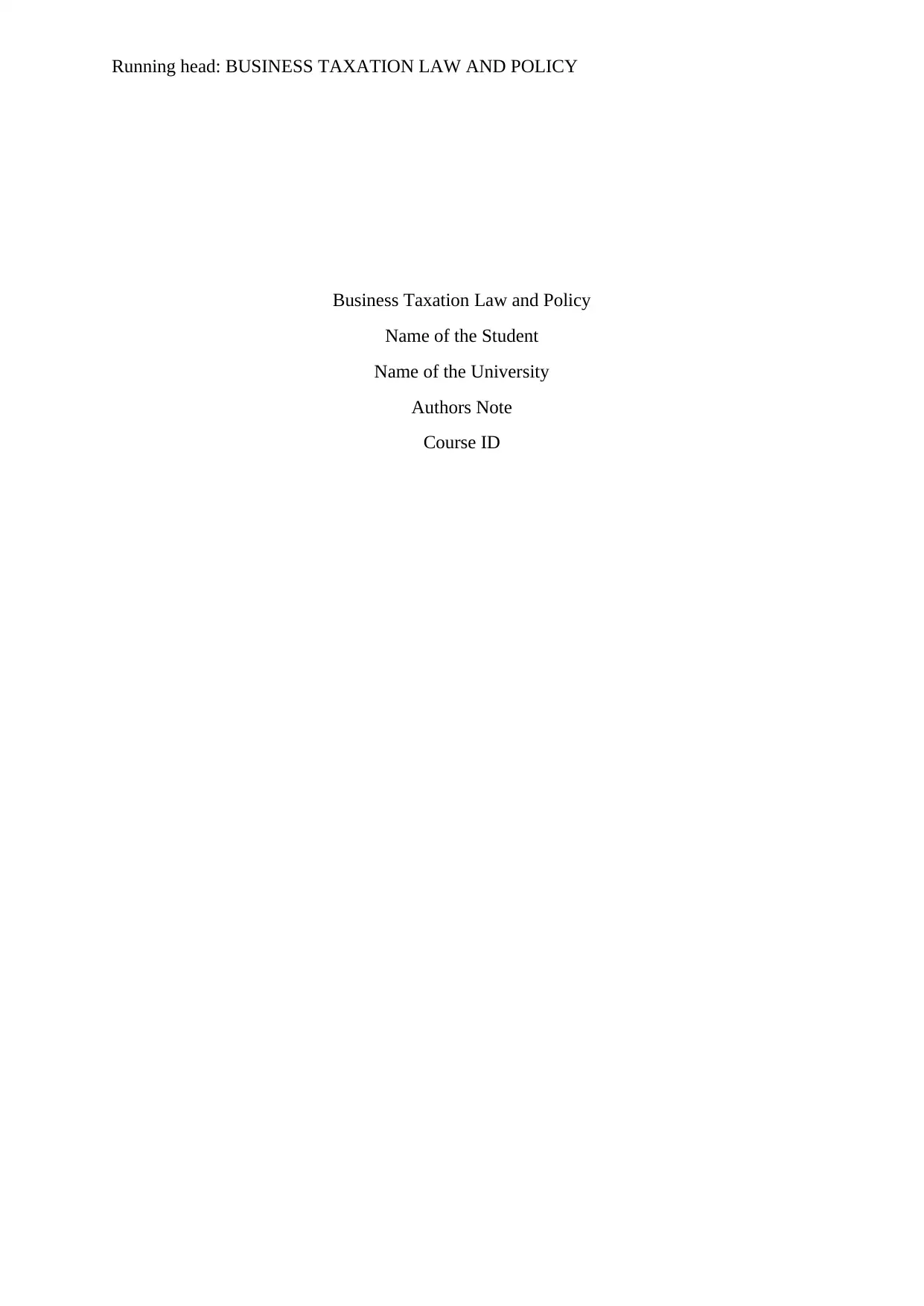
Running head: BUSINESS TAXATION LAW AND POLICY
Business Taxation Law and Policy
Name of the Student
Name of the University
Authors Note
Course ID
Business Taxation Law and Policy
Name of the Student
Name of the University
Authors Note
Course ID
Secure Best Marks with AI Grader
Need help grading? Try our AI Grader for instant feedback on your assignments.
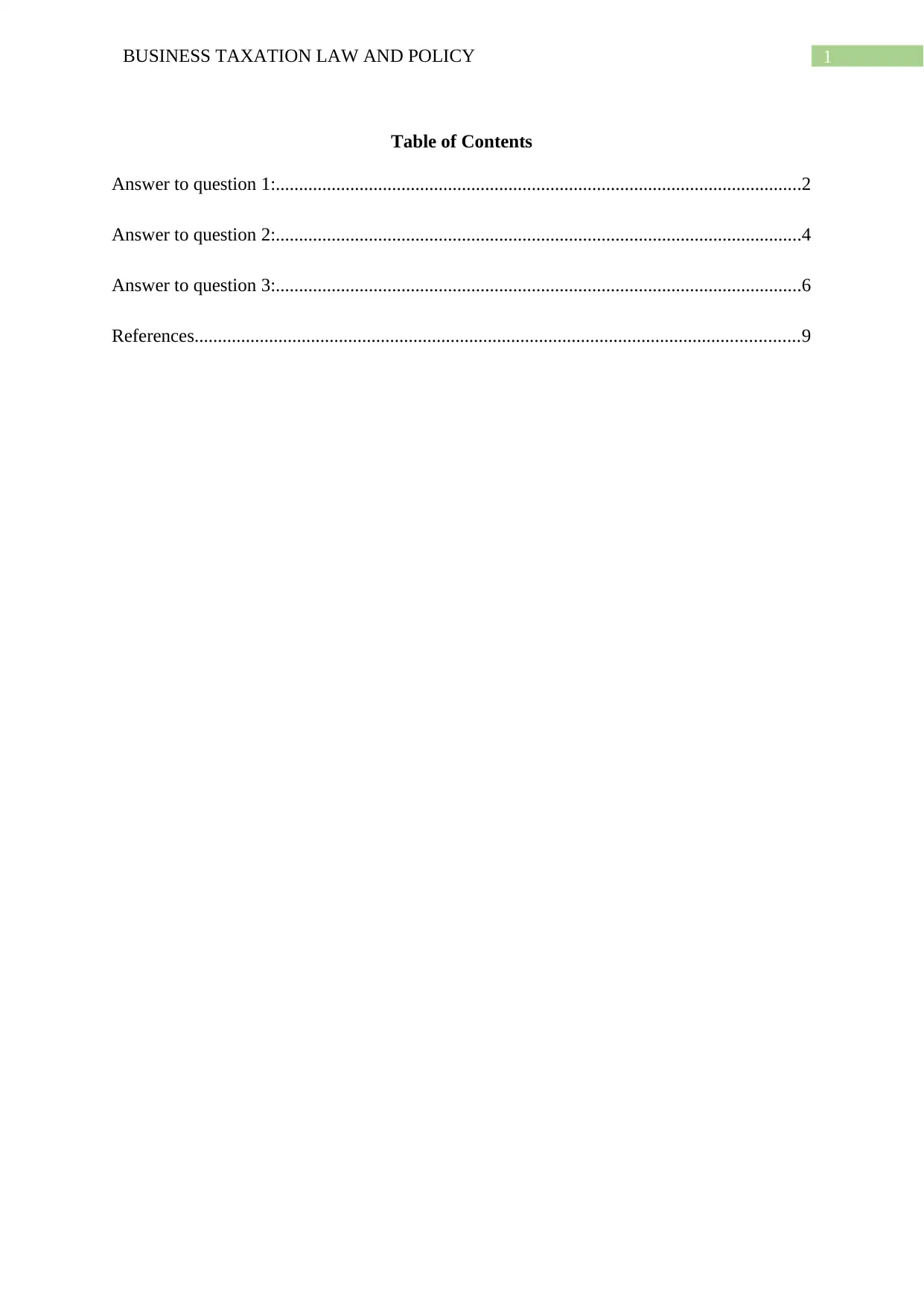
1BUSINESS TAXATION LAW AND POLICY
Table of Contents
Answer to question 1:.................................................................................................................2
Answer to question 2:.................................................................................................................4
Answer to question 3:.................................................................................................................6
References..................................................................................................................................9
Table of Contents
Answer to question 1:.................................................................................................................2
Answer to question 2:.................................................................................................................4
Answer to question 3:.................................................................................................................6
References..................................................................................................................................9
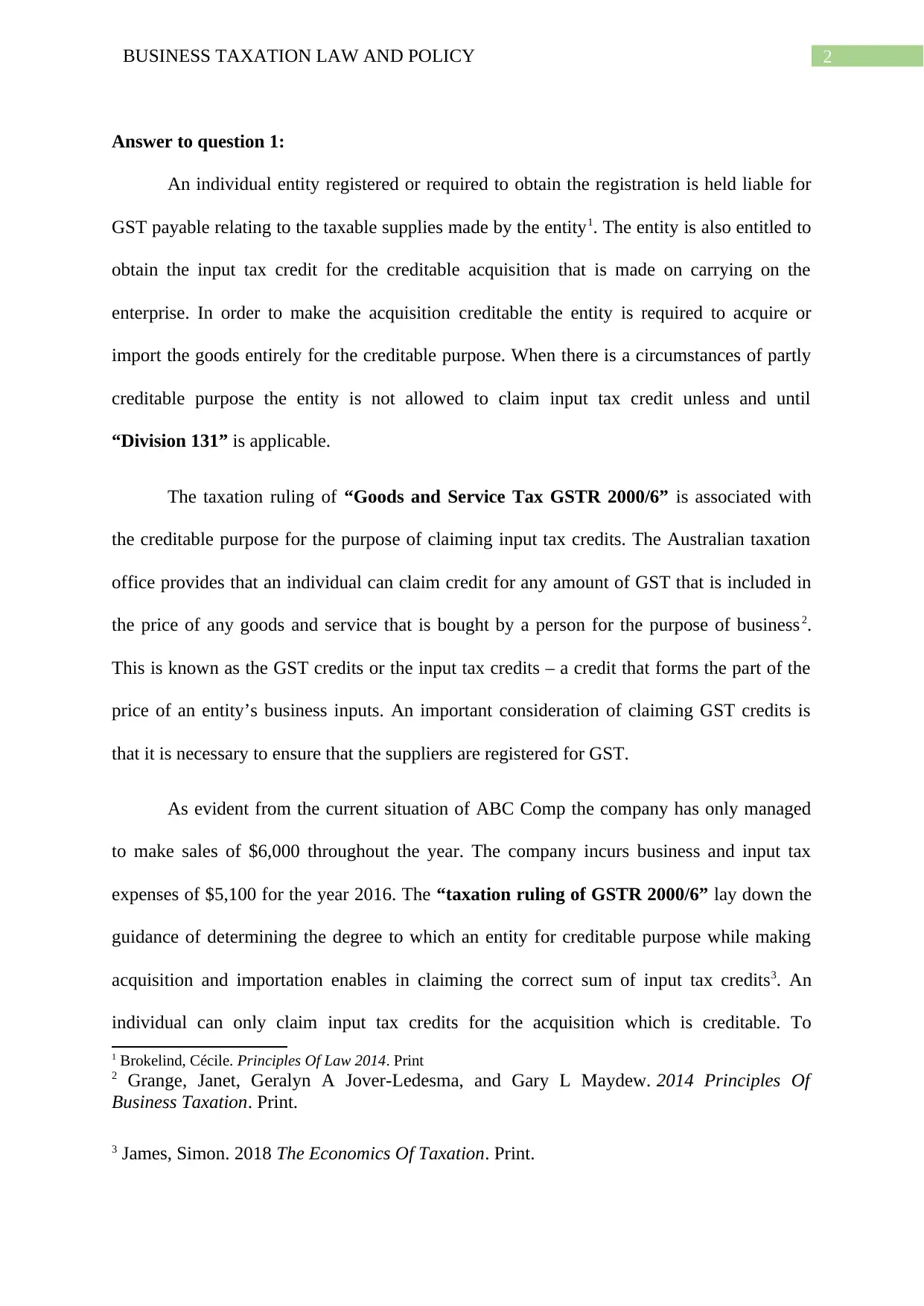
2BUSINESS TAXATION LAW AND POLICY
Answer to question 1:
An individual entity registered or required to obtain the registration is held liable for
GST payable relating to the taxable supplies made by the entity1. The entity is also entitled to
obtain the input tax credit for the creditable acquisition that is made on carrying on the
enterprise. In order to make the acquisition creditable the entity is required to acquire or
import the goods entirely for the creditable purpose. When there is a circumstances of partly
creditable purpose the entity is not allowed to claim input tax credit unless and until
“Division 131” is applicable.
The taxation ruling of “Goods and Service Tax GSTR 2000/6” is associated with
the creditable purpose for the purpose of claiming input tax credits. The Australian taxation
office provides that an individual can claim credit for any amount of GST that is included in
the price of any goods and service that is bought by a person for the purpose of business2.
This is known as the GST credits or the input tax credits – a credit that forms the part of the
price of an entity’s business inputs. An important consideration of claiming GST credits is
that it is necessary to ensure that the suppliers are registered for GST.
As evident from the current situation of ABC Comp the company has only managed
to make sales of $6,000 throughout the year. The company incurs business and input tax
expenses of $5,100 for the year 2016. The “taxation ruling of GSTR 2000/6” lay down the
guidance of determining the degree to which an entity for creditable purpose while making
acquisition and importation enables in claiming the correct sum of input tax credits3. An
individual can only claim input tax credits for the acquisition which is creditable. To
1 Brokelind, Cécile. Principles Of Law 2014. Print
2 Grange, Janet, Geralyn A Jover-Ledesma, and Gary L Maydew. 2014 Principles Of
Business Taxation. Print.
3 James, Simon. 2018 The Economics Of Taxation. Print.
Answer to question 1:
An individual entity registered or required to obtain the registration is held liable for
GST payable relating to the taxable supplies made by the entity1. The entity is also entitled to
obtain the input tax credit for the creditable acquisition that is made on carrying on the
enterprise. In order to make the acquisition creditable the entity is required to acquire or
import the goods entirely for the creditable purpose. When there is a circumstances of partly
creditable purpose the entity is not allowed to claim input tax credit unless and until
“Division 131” is applicable.
The taxation ruling of “Goods and Service Tax GSTR 2000/6” is associated with
the creditable purpose for the purpose of claiming input tax credits. The Australian taxation
office provides that an individual can claim credit for any amount of GST that is included in
the price of any goods and service that is bought by a person for the purpose of business2.
This is known as the GST credits or the input tax credits – a credit that forms the part of the
price of an entity’s business inputs. An important consideration of claiming GST credits is
that it is necessary to ensure that the suppliers are registered for GST.
As evident from the current situation of ABC Comp the company has only managed
to make sales of $6,000 throughout the year. The company incurs business and input tax
expenses of $5,100 for the year 2016. The “taxation ruling of GSTR 2000/6” lay down the
guidance of determining the degree to which an entity for creditable purpose while making
acquisition and importation enables in claiming the correct sum of input tax credits3. An
individual can only claim input tax credits for the acquisition which is creditable. To
1 Brokelind, Cécile. Principles Of Law 2014. Print
2 Grange, Janet, Geralyn A Jover-Ledesma, and Gary L Maydew. 2014 Principles Of
Business Taxation. Print.
3 James, Simon. 2018 The Economics Of Taxation. Print.
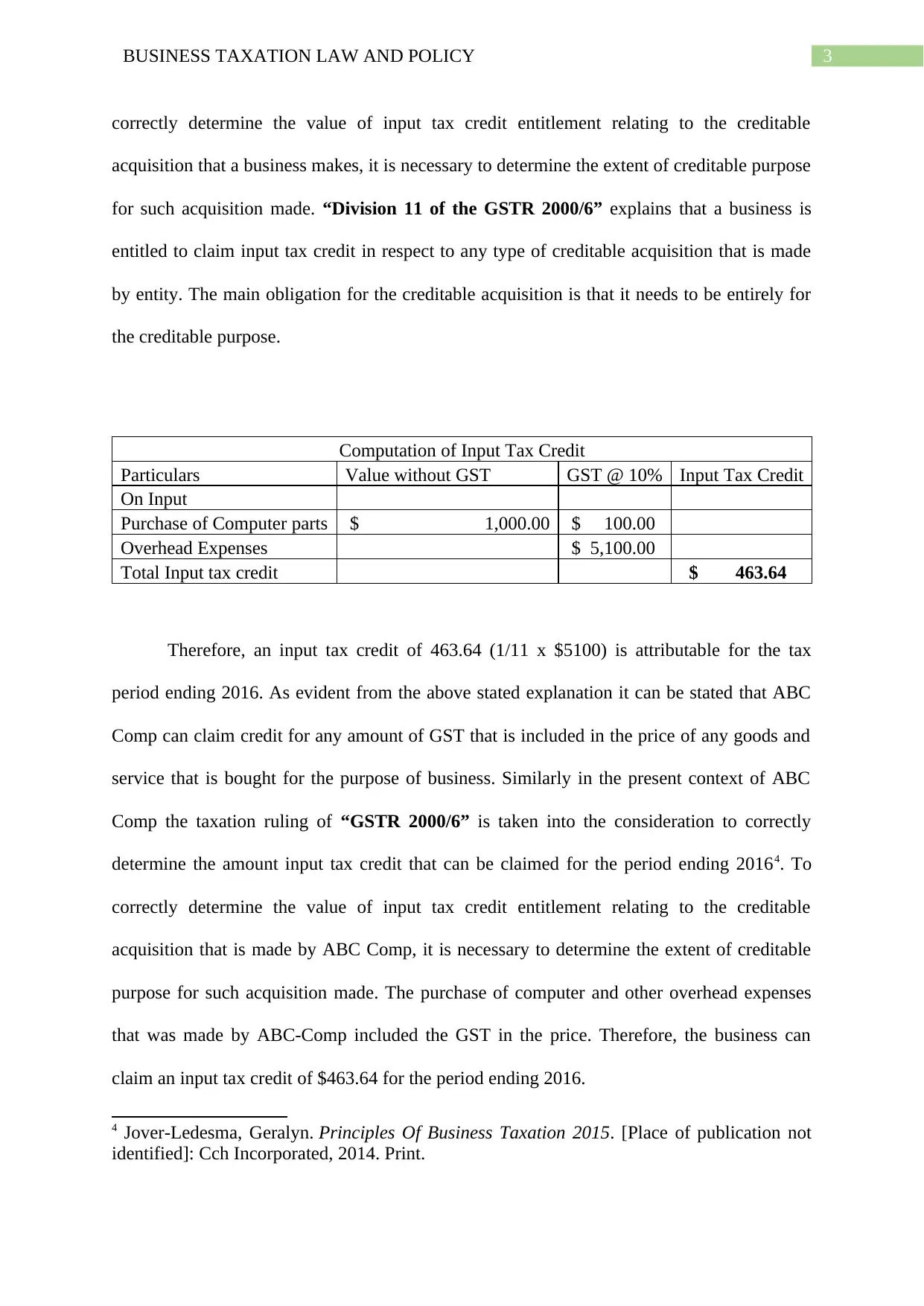
3BUSINESS TAXATION LAW AND POLICY
correctly determine the value of input tax credit entitlement relating to the creditable
acquisition that a business makes, it is necessary to determine the extent of creditable purpose
for such acquisition made. “Division 11 of the GSTR 2000/6” explains that a business is
entitled to claim input tax credit in respect to any type of creditable acquisition that is made
by entity. The main obligation for the creditable acquisition is that it needs to be entirely for
the creditable purpose.
Computation of Input Tax Credit
Particulars Value without GST GST @ 10% Input Tax Credit
On Input
Purchase of Computer parts $ 1,000.00 $ 100.00
Overhead Expenses $ 5,100.00
Total Input tax credit $ 463.64
Therefore, an input tax credit of 463.64 (1/11 x $5100) is attributable for the tax
period ending 2016. As evident from the above stated explanation it can be stated that ABC
Comp can claim credit for any amount of GST that is included in the price of any goods and
service that is bought for the purpose of business. Similarly in the present context of ABC
Comp the taxation ruling of “GSTR 2000/6” is taken into the consideration to correctly
determine the amount input tax credit that can be claimed for the period ending 20164. To
correctly determine the value of input tax credit entitlement relating to the creditable
acquisition that is made by ABC Comp, it is necessary to determine the extent of creditable
purpose for such acquisition made. The purchase of computer and other overhead expenses
that was made by ABC-Comp included the GST in the price. Therefore, the business can
claim an input tax credit of $463.64 for the period ending 2016.
4 Jover-Ledesma, Geralyn. Principles Of Business Taxation 2015. [Place of publication not
identified]: Cch Incorporated, 2014. Print.
correctly determine the value of input tax credit entitlement relating to the creditable
acquisition that a business makes, it is necessary to determine the extent of creditable purpose
for such acquisition made. “Division 11 of the GSTR 2000/6” explains that a business is
entitled to claim input tax credit in respect to any type of creditable acquisition that is made
by entity. The main obligation for the creditable acquisition is that it needs to be entirely for
the creditable purpose.
Computation of Input Tax Credit
Particulars Value without GST GST @ 10% Input Tax Credit
On Input
Purchase of Computer parts $ 1,000.00 $ 100.00
Overhead Expenses $ 5,100.00
Total Input tax credit $ 463.64
Therefore, an input tax credit of 463.64 (1/11 x $5100) is attributable for the tax
period ending 2016. As evident from the above stated explanation it can be stated that ABC
Comp can claim credit for any amount of GST that is included in the price of any goods and
service that is bought for the purpose of business. Similarly in the present context of ABC
Comp the taxation ruling of “GSTR 2000/6” is taken into the consideration to correctly
determine the amount input tax credit that can be claimed for the period ending 20164. To
correctly determine the value of input tax credit entitlement relating to the creditable
acquisition that is made by ABC Comp, it is necessary to determine the extent of creditable
purpose for such acquisition made. The purchase of computer and other overhead expenses
that was made by ABC-Comp included the GST in the price. Therefore, the business can
claim an input tax credit of $463.64 for the period ending 2016.
4 Jover-Ledesma, Geralyn. Principles Of Business Taxation 2015. [Place of publication not
identified]: Cch Incorporated, 2014. Print.
Secure Best Marks with AI Grader
Need help grading? Try our AI Grader for instant feedback on your assignments.
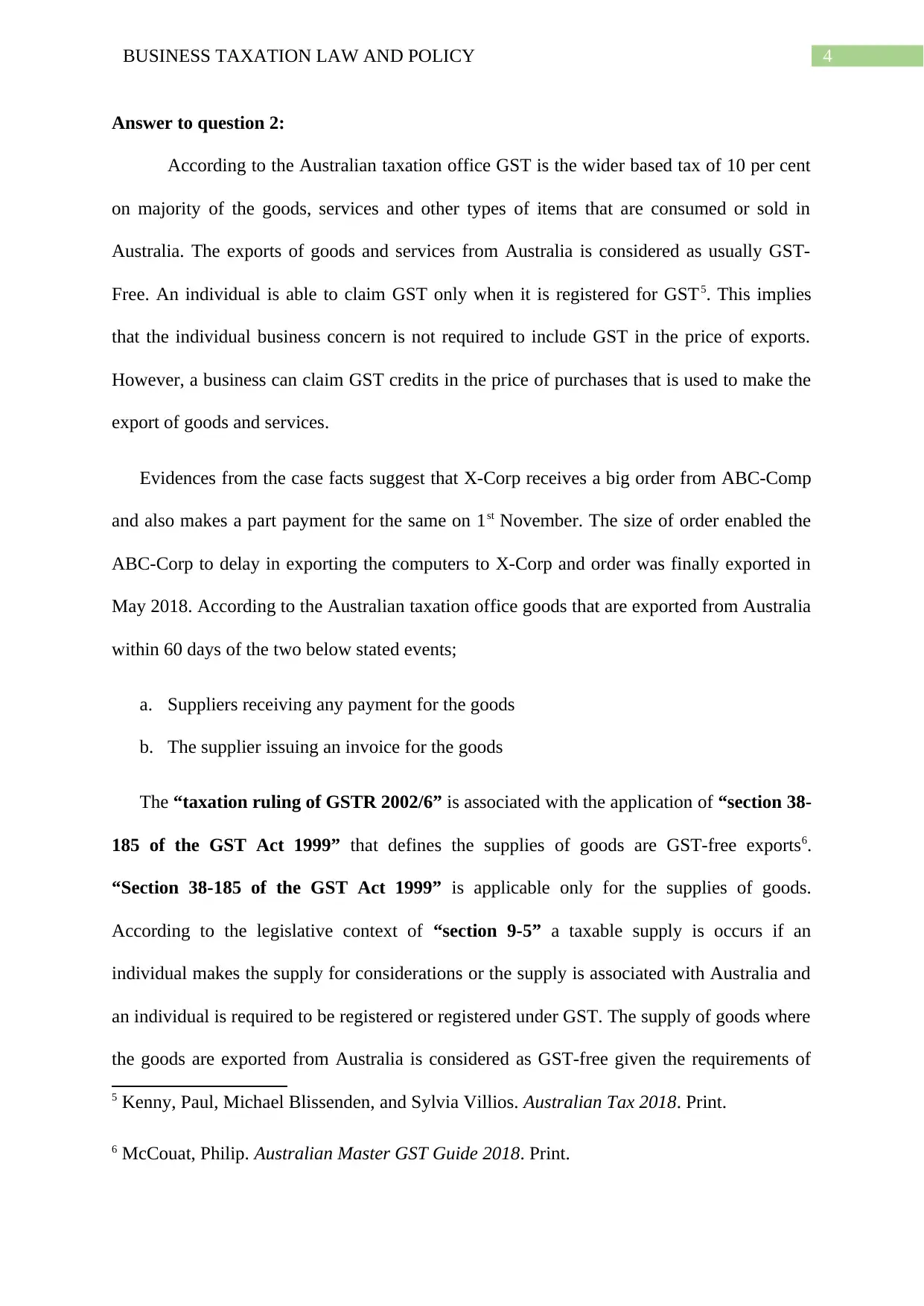
4BUSINESS TAXATION LAW AND POLICY
Answer to question 2:
According to the Australian taxation office GST is the wider based tax of 10 per cent
on majority of the goods, services and other types of items that are consumed or sold in
Australia. The exports of goods and services from Australia is considered as usually GST-
Free. An individual is able to claim GST only when it is registered for GST5. This implies
that the individual business concern is not required to include GST in the price of exports.
However, a business can claim GST credits in the price of purchases that is used to make the
export of goods and services.
Evidences from the case facts suggest that X-Corp receives a big order from ABC-Comp
and also makes a part payment for the same on 1st November. The size of order enabled the
ABC-Corp to delay in exporting the computers to X-Corp and order was finally exported in
May 2018. According to the Australian taxation office goods that are exported from Australia
within 60 days of the two below stated events;
a. Suppliers receiving any payment for the goods
b. The supplier issuing an invoice for the goods
The “taxation ruling of GSTR 2002/6” is associated with the application of “section 38-
185 of the GST Act 1999” that defines the supplies of goods are GST-free exports6.
“Section 38-185 of the GST Act 1999” is applicable only for the supplies of goods.
According to the legislative context of “section 9-5” a taxable supply is occurs if an
individual makes the supply for considerations or the supply is associated with Australia and
an individual is required to be registered or registered under GST. The supply of goods where
the goods are exported from Australia is considered as GST-free given the requirements of
5 Kenny, Paul, Michael Blissenden, and Sylvia Villios. Australian Tax 2018. Print.
6 McCouat, Philip. Australian Master GST Guide 2018. Print.
Answer to question 2:
According to the Australian taxation office GST is the wider based tax of 10 per cent
on majority of the goods, services and other types of items that are consumed or sold in
Australia. The exports of goods and services from Australia is considered as usually GST-
Free. An individual is able to claim GST only when it is registered for GST5. This implies
that the individual business concern is not required to include GST in the price of exports.
However, a business can claim GST credits in the price of purchases that is used to make the
export of goods and services.
Evidences from the case facts suggest that X-Corp receives a big order from ABC-Comp
and also makes a part payment for the same on 1st November. The size of order enabled the
ABC-Corp to delay in exporting the computers to X-Corp and order was finally exported in
May 2018. According to the Australian taxation office goods that are exported from Australia
within 60 days of the two below stated events;
a. Suppliers receiving any payment for the goods
b. The supplier issuing an invoice for the goods
The “taxation ruling of GSTR 2002/6” is associated with the application of “section 38-
185 of the GST Act 1999” that defines the supplies of goods are GST-free exports6.
“Section 38-185 of the GST Act 1999” is applicable only for the supplies of goods.
According to the legislative context of “section 9-5” a taxable supply is occurs if an
individual makes the supply for considerations or the supply is associated with Australia and
an individual is required to be registered or registered under GST. The supply of goods where
the goods are exported from Australia is considered as GST-free given the requirements of
5 Kenny, Paul, Michael Blissenden, and Sylvia Villios. Australian Tax 2018. Print.
6 McCouat, Philip. Australian Master GST Guide 2018. Print.
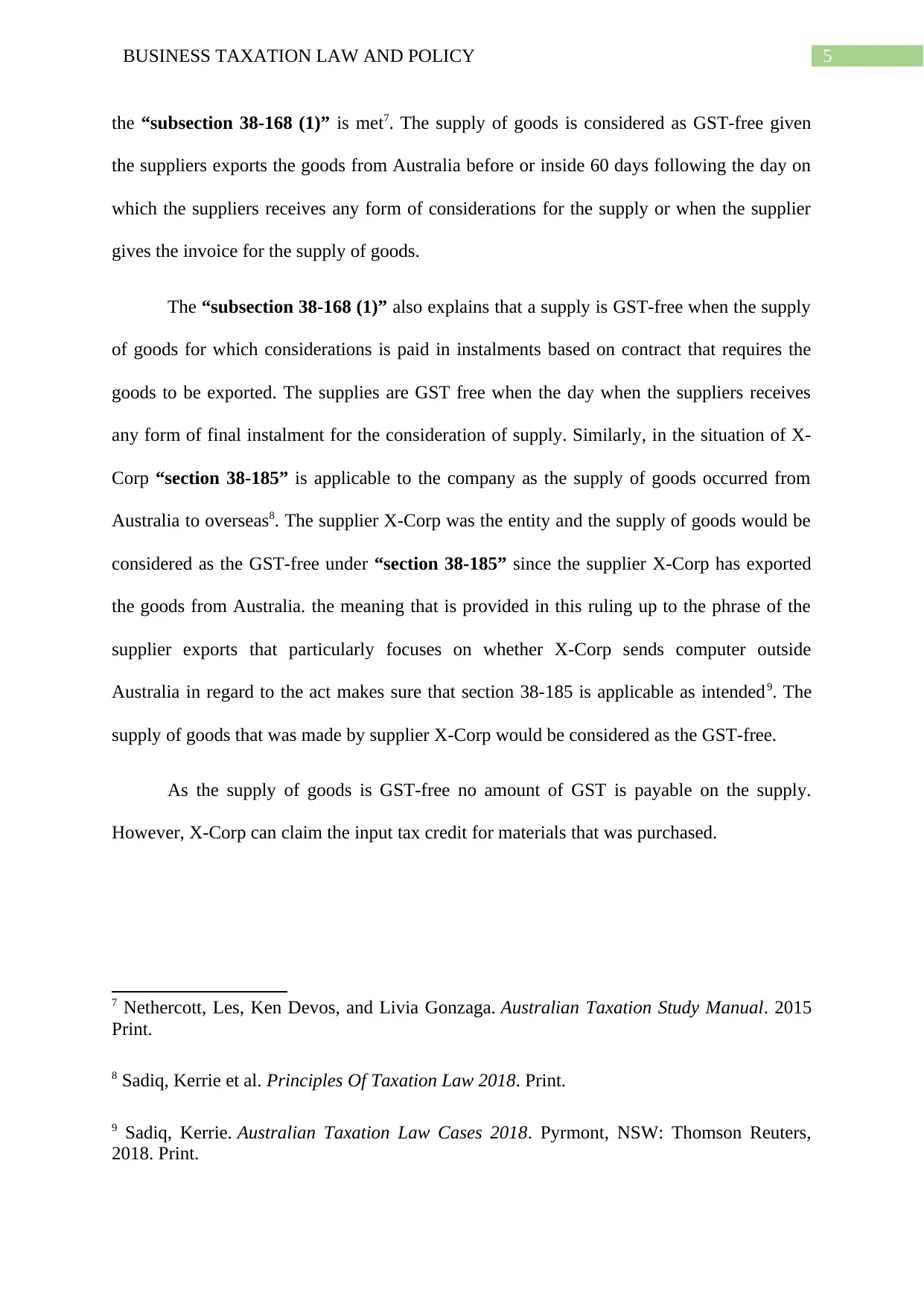
5BUSINESS TAXATION LAW AND POLICY
the “subsection 38-168 (1)” is met7. The supply of goods is considered as GST-free given
the suppliers exports the goods from Australia before or inside 60 days following the day on
which the suppliers receives any form of considerations for the supply or when the supplier
gives the invoice for the supply of goods.
The “subsection 38-168 (1)” also explains that a supply is GST-free when the supply
of goods for which considerations is paid in instalments based on contract that requires the
goods to be exported. The supplies are GST free when the day when the suppliers receives
any form of final instalment for the consideration of supply. Similarly, in the situation of X-
Corp “section 38-185” is applicable to the company as the supply of goods occurred from
Australia to overseas8. The supplier X-Corp was the entity and the supply of goods would be
considered as the GST-free under “section 38-185” since the supplier X-Corp has exported
the goods from Australia. the meaning that is provided in this ruling up to the phrase of the
supplier exports that particularly focuses on whether X-Corp sends computer outside
Australia in regard to the act makes sure that section 38-185 is applicable as intended9. The
supply of goods that was made by supplier X-Corp would be considered as the GST-free.
As the supply of goods is GST-free no amount of GST is payable on the supply.
However, X-Corp can claim the input tax credit for materials that was purchased.
7 Nethercott, Les, Ken Devos, and Livia Gonzaga. Australian Taxation Study Manual. 2015
Print.
8 Sadiq, Kerrie et al. Principles Of Taxation Law 2018. Print.
9 Sadiq, Kerrie. Australian Taxation Law Cases 2018. Pyrmont, NSW: Thomson Reuters,
2018. Print.
the “subsection 38-168 (1)” is met7. The supply of goods is considered as GST-free given
the suppliers exports the goods from Australia before or inside 60 days following the day on
which the suppliers receives any form of considerations for the supply or when the supplier
gives the invoice for the supply of goods.
The “subsection 38-168 (1)” also explains that a supply is GST-free when the supply
of goods for which considerations is paid in instalments based on contract that requires the
goods to be exported. The supplies are GST free when the day when the suppliers receives
any form of final instalment for the consideration of supply. Similarly, in the situation of X-
Corp “section 38-185” is applicable to the company as the supply of goods occurred from
Australia to overseas8. The supplier X-Corp was the entity and the supply of goods would be
considered as the GST-free under “section 38-185” since the supplier X-Corp has exported
the goods from Australia. the meaning that is provided in this ruling up to the phrase of the
supplier exports that particularly focuses on whether X-Corp sends computer outside
Australia in regard to the act makes sure that section 38-185 is applicable as intended9. The
supply of goods that was made by supplier X-Corp would be considered as the GST-free.
As the supply of goods is GST-free no amount of GST is payable on the supply.
However, X-Corp can claim the input tax credit for materials that was purchased.
7 Nethercott, Les, Ken Devos, and Livia Gonzaga. Australian Taxation Study Manual. 2015
Print.
8 Sadiq, Kerrie et al. Principles Of Taxation Law 2018. Print.
9 Sadiq, Kerrie. Australian Taxation Law Cases 2018. Pyrmont, NSW: Thomson Reuters,
2018. Print.
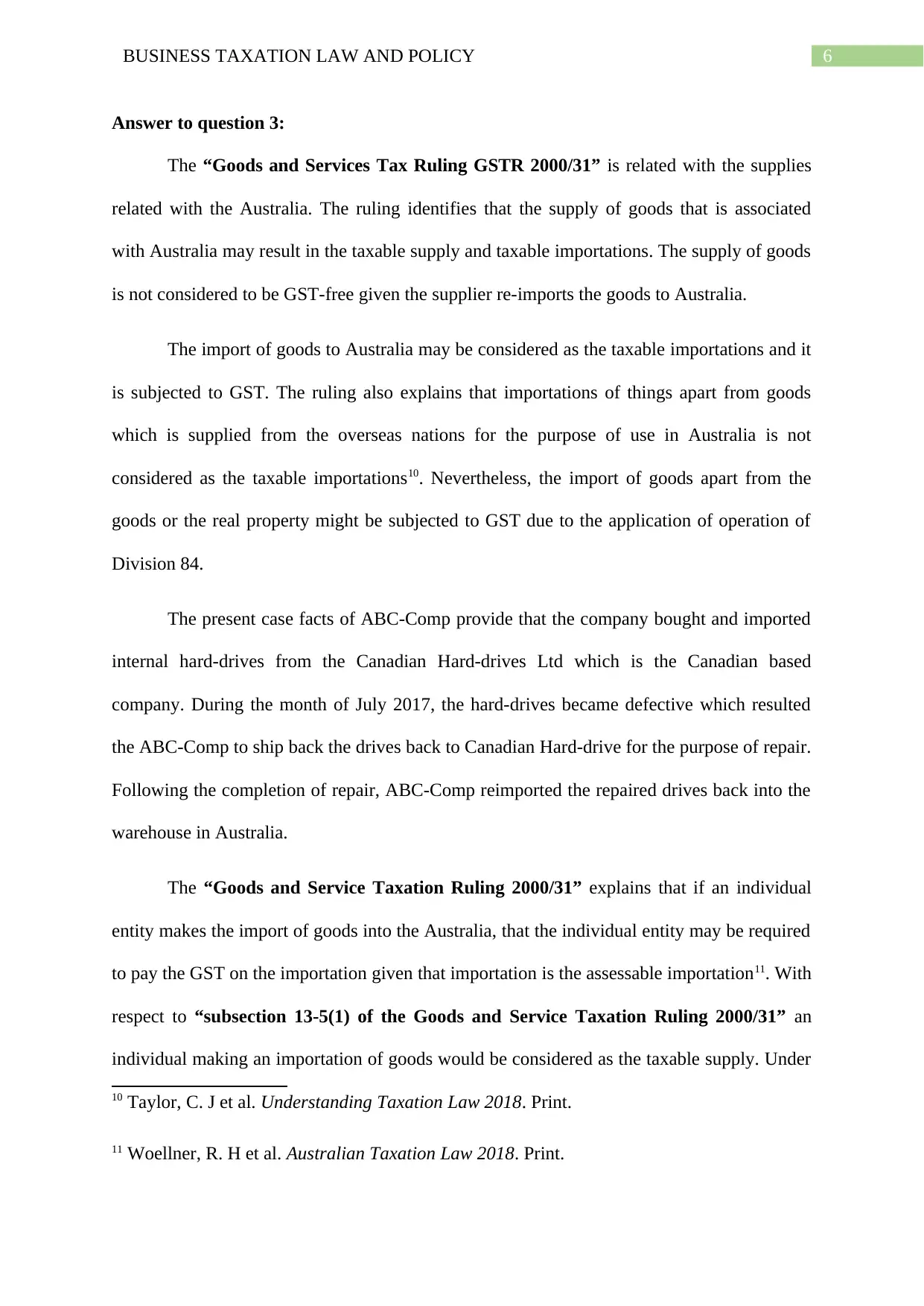
6BUSINESS TAXATION LAW AND POLICY
Answer to question 3:
The “Goods and Services Tax Ruling GSTR 2000/31” is related with the supplies
related with the Australia. The ruling identifies that the supply of goods that is associated
with Australia may result in the taxable supply and taxable importations. The supply of goods
is not considered to be GST-free given the supplier re-imports the goods to Australia.
The import of goods to Australia may be considered as the taxable importations and it
is subjected to GST. The ruling also explains that importations of things apart from goods
which is supplied from the overseas nations for the purpose of use in Australia is not
considered as the taxable importations10. Nevertheless, the import of goods apart from the
goods or the real property might be subjected to GST due to the application of operation of
Division 84.
The present case facts of ABC-Comp provide that the company bought and imported
internal hard-drives from the Canadian Hard-drives Ltd which is the Canadian based
company. During the month of July 2017, the hard-drives became defective which resulted
the ABC-Comp to ship back the drives back to Canadian Hard-drive for the purpose of repair.
Following the completion of repair, ABC-Comp reimported the repaired drives back into the
warehouse in Australia.
The “Goods and Service Taxation Ruling 2000/31” explains that if an individual
entity makes the import of goods into the Australia, that the individual entity may be required
to pay the GST on the importation given that importation is the assessable importation11. With
respect to “subsection 13-5(1) of the Goods and Service Taxation Ruling 2000/31” an
individual making an importation of goods would be considered as the taxable supply. Under
10 Taylor, C. J et al. Understanding Taxation Law 2018. Print.
11 Woellner, R. H et al. Australian Taxation Law 2018. Print.
Answer to question 3:
The “Goods and Services Tax Ruling GSTR 2000/31” is related with the supplies
related with the Australia. The ruling identifies that the supply of goods that is associated
with Australia may result in the taxable supply and taxable importations. The supply of goods
is not considered to be GST-free given the supplier re-imports the goods to Australia.
The import of goods to Australia may be considered as the taxable importations and it
is subjected to GST. The ruling also explains that importations of things apart from goods
which is supplied from the overseas nations for the purpose of use in Australia is not
considered as the taxable importations10. Nevertheless, the import of goods apart from the
goods or the real property might be subjected to GST due to the application of operation of
Division 84.
The present case facts of ABC-Comp provide that the company bought and imported
internal hard-drives from the Canadian Hard-drives Ltd which is the Canadian based
company. During the month of July 2017, the hard-drives became defective which resulted
the ABC-Comp to ship back the drives back to Canadian Hard-drive for the purpose of repair.
Following the completion of repair, ABC-Comp reimported the repaired drives back into the
warehouse in Australia.
The “Goods and Service Taxation Ruling 2000/31” explains that if an individual
entity makes the import of goods into the Australia, that the individual entity may be required
to pay the GST on the importation given that importation is the assessable importation11. With
respect to “subsection 13-5(1) of the Goods and Service Taxation Ruling 2000/31” an
individual making an importation of goods would be considered as the taxable supply. Under
10 Taylor, C. J et al. Understanding Taxation Law 2018. Print.
11 Woellner, R. H et al. Australian Taxation Law 2018. Print.
Paraphrase This Document
Need a fresh take? Get an instant paraphrase of this document with our AI Paraphraser
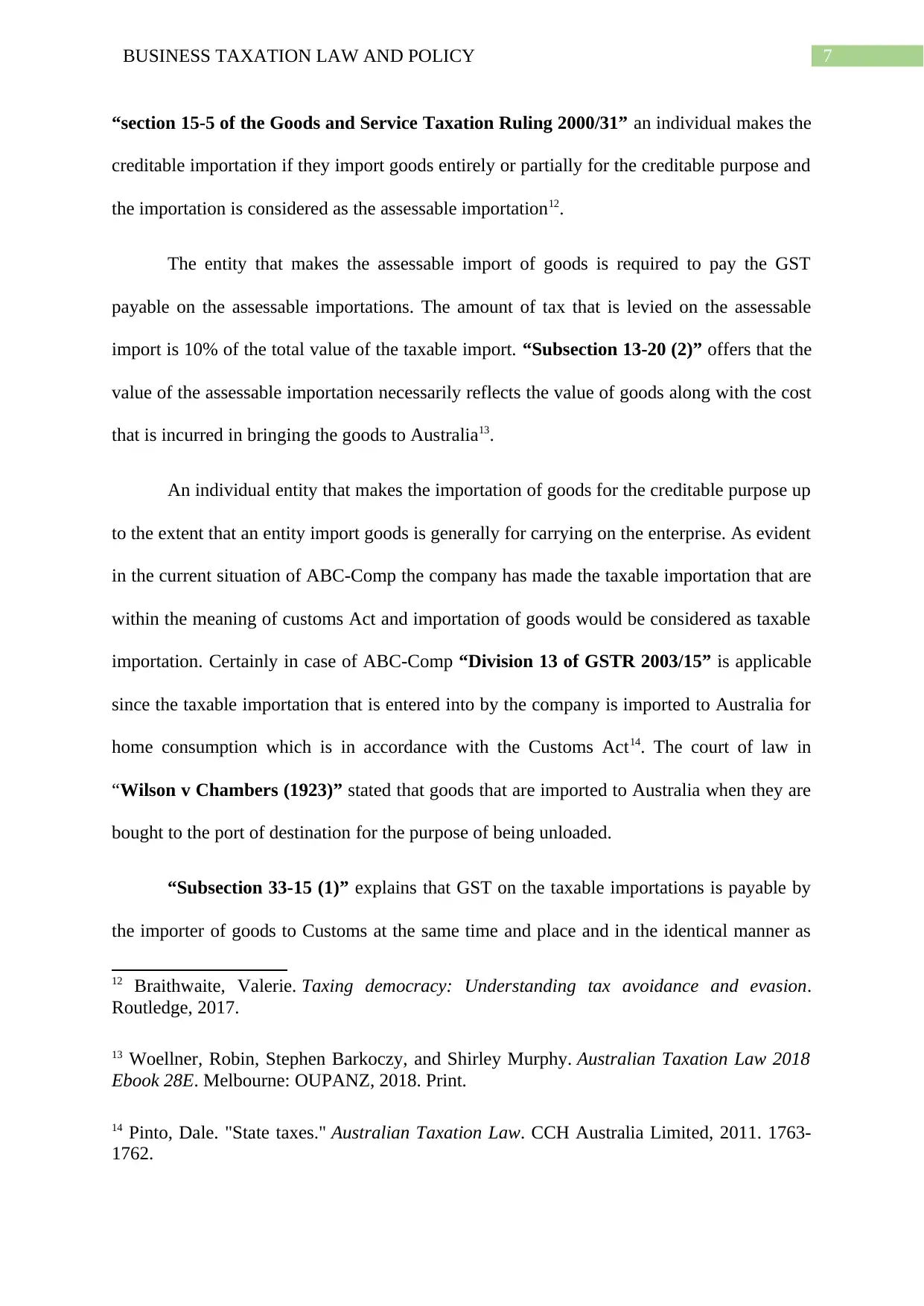
7BUSINESS TAXATION LAW AND POLICY
“section 15-5 of the Goods and Service Taxation Ruling 2000/31” an individual makes the
creditable importation if they import goods entirely or partially for the creditable purpose and
the importation is considered as the assessable importation12.
The entity that makes the assessable import of goods is required to pay the GST
payable on the assessable importations. The amount of tax that is levied on the assessable
import is 10% of the total value of the taxable import. “Subsection 13-20 (2)” offers that the
value of the assessable importation necessarily reflects the value of goods along with the cost
that is incurred in bringing the goods to Australia13.
An individual entity that makes the importation of goods for the creditable purpose up
to the extent that an entity import goods is generally for carrying on the enterprise. As evident
in the current situation of ABC-Comp the company has made the taxable importation that are
within the meaning of customs Act and importation of goods would be considered as taxable
importation. Certainly in case of ABC-Comp “Division 13 of GSTR 2003/15” is applicable
since the taxable importation that is entered into by the company is imported to Australia for
home consumption which is in accordance with the Customs Act14. The court of law in
“Wilson v Chambers (1923)” stated that goods that are imported to Australia when they are
bought to the port of destination for the purpose of being unloaded.
“Subsection 33-15 (1)” explains that GST on the taxable importations is payable by
the importer of goods to Customs at the same time and place and in the identical manner as
12 Braithwaite, Valerie. Taxing democracy: Understanding tax avoidance and evasion.
Routledge, 2017.
13 Woellner, Robin, Stephen Barkoczy, and Shirley Murphy. Australian Taxation Law 2018
Ebook 28E. Melbourne: OUPANZ, 2018. Print.
14 Pinto, Dale. "State taxes." Australian Taxation Law. CCH Australia Limited, 2011. 1763-
1762.
“section 15-5 of the Goods and Service Taxation Ruling 2000/31” an individual makes the
creditable importation if they import goods entirely or partially for the creditable purpose and
the importation is considered as the assessable importation12.
The entity that makes the assessable import of goods is required to pay the GST
payable on the assessable importations. The amount of tax that is levied on the assessable
import is 10% of the total value of the taxable import. “Subsection 13-20 (2)” offers that the
value of the assessable importation necessarily reflects the value of goods along with the cost
that is incurred in bringing the goods to Australia13.
An individual entity that makes the importation of goods for the creditable purpose up
to the extent that an entity import goods is generally for carrying on the enterprise. As evident
in the current situation of ABC-Comp the company has made the taxable importation that are
within the meaning of customs Act and importation of goods would be considered as taxable
importation. Certainly in case of ABC-Comp “Division 13 of GSTR 2003/15” is applicable
since the taxable importation that is entered into by the company is imported to Australia for
home consumption which is in accordance with the Customs Act14. The court of law in
“Wilson v Chambers (1923)” stated that goods that are imported to Australia when they are
bought to the port of destination for the purpose of being unloaded.
“Subsection 33-15 (1)” explains that GST on the taxable importations is payable by
the importer of goods to Customs at the same time and place and in the identical manner as
12 Braithwaite, Valerie. Taxing democracy: Understanding tax avoidance and evasion.
Routledge, 2017.
13 Woellner, Robin, Stephen Barkoczy, and Shirley Murphy. Australian Taxation Law 2018
Ebook 28E. Melbourne: OUPANZ, 2018. Print.
14 Pinto, Dale. "State taxes." Australian Taxation Law. CCH Australia Limited, 2011. 1763-
1762.
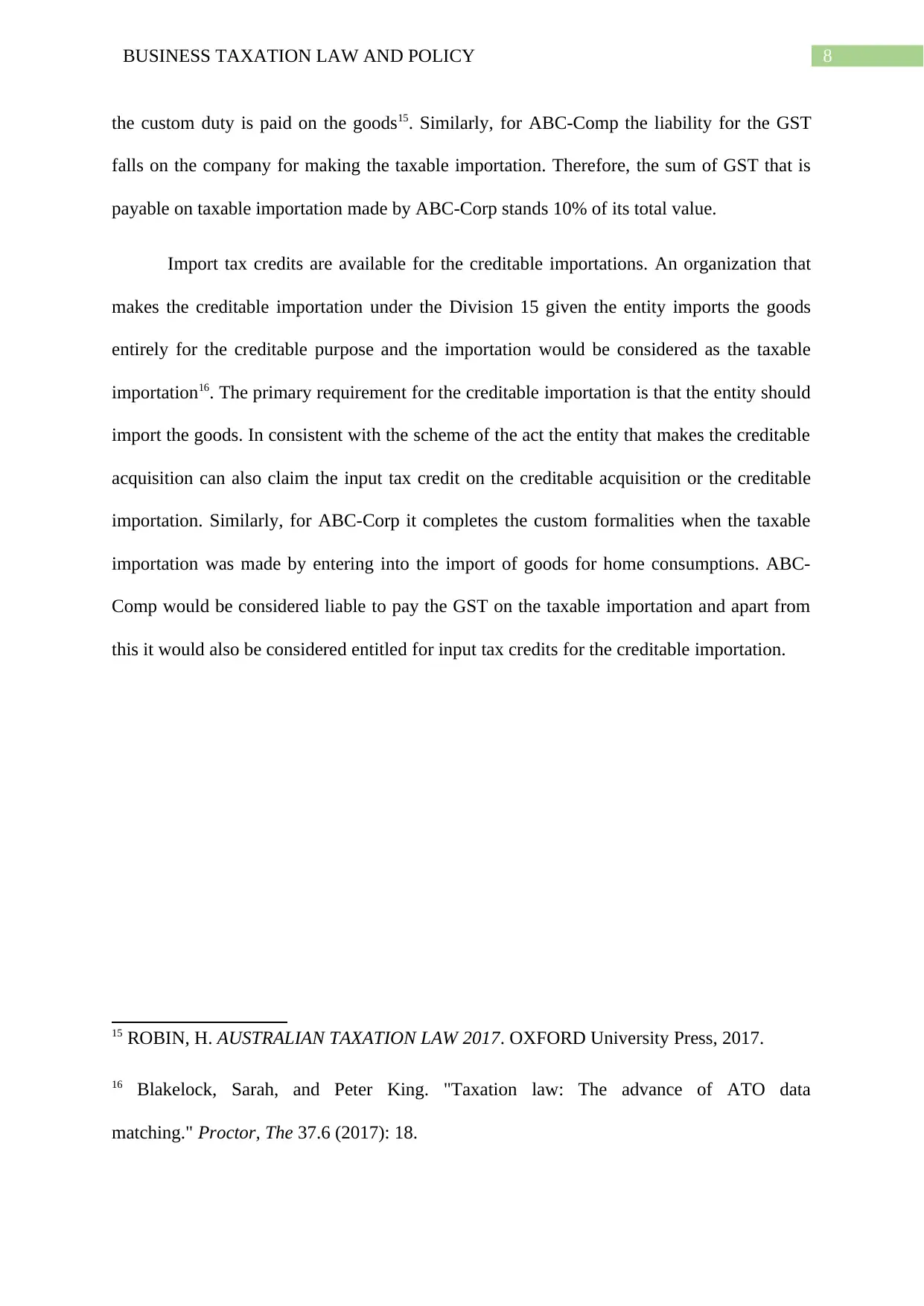
8BUSINESS TAXATION LAW AND POLICY
the custom duty is paid on the goods15. Similarly, for ABC-Comp the liability for the GST
falls on the company for making the taxable importation. Therefore, the sum of GST that is
payable on taxable importation made by ABC-Corp stands 10% of its total value.
Import tax credits are available for the creditable importations. An organization that
makes the creditable importation under the Division 15 given the entity imports the goods
entirely for the creditable purpose and the importation would be considered as the taxable
importation16. The primary requirement for the creditable importation is that the entity should
import the goods. In consistent with the scheme of the act the entity that makes the creditable
acquisition can also claim the input tax credit on the creditable acquisition or the creditable
importation. Similarly, for ABC-Corp it completes the custom formalities when the taxable
importation was made by entering into the import of goods for home consumptions. ABC-
Comp would be considered liable to pay the GST on the taxable importation and apart from
this it would also be considered entitled for input tax credits for the creditable importation.
15 ROBIN, H. AUSTRALIAN TAXATION LAW 2017. OXFORD University Press, 2017.
16 Blakelock, Sarah, and Peter King. "Taxation law: The advance of ATO data
matching." Proctor, The 37.6 (2017): 18.
the custom duty is paid on the goods15. Similarly, for ABC-Comp the liability for the GST
falls on the company for making the taxable importation. Therefore, the sum of GST that is
payable on taxable importation made by ABC-Corp stands 10% of its total value.
Import tax credits are available for the creditable importations. An organization that
makes the creditable importation under the Division 15 given the entity imports the goods
entirely for the creditable purpose and the importation would be considered as the taxable
importation16. The primary requirement for the creditable importation is that the entity should
import the goods. In consistent with the scheme of the act the entity that makes the creditable
acquisition can also claim the input tax credit on the creditable acquisition or the creditable
importation. Similarly, for ABC-Corp it completes the custom formalities when the taxable
importation was made by entering into the import of goods for home consumptions. ABC-
Comp would be considered liable to pay the GST on the taxable importation and apart from
this it would also be considered entitled for input tax credits for the creditable importation.
15 ROBIN, H. AUSTRALIAN TAXATION LAW 2017. OXFORD University Press, 2017.
16 Blakelock, Sarah, and Peter King. "Taxation law: The advance of ATO data
matching." Proctor, The 37.6 (2017): 18.
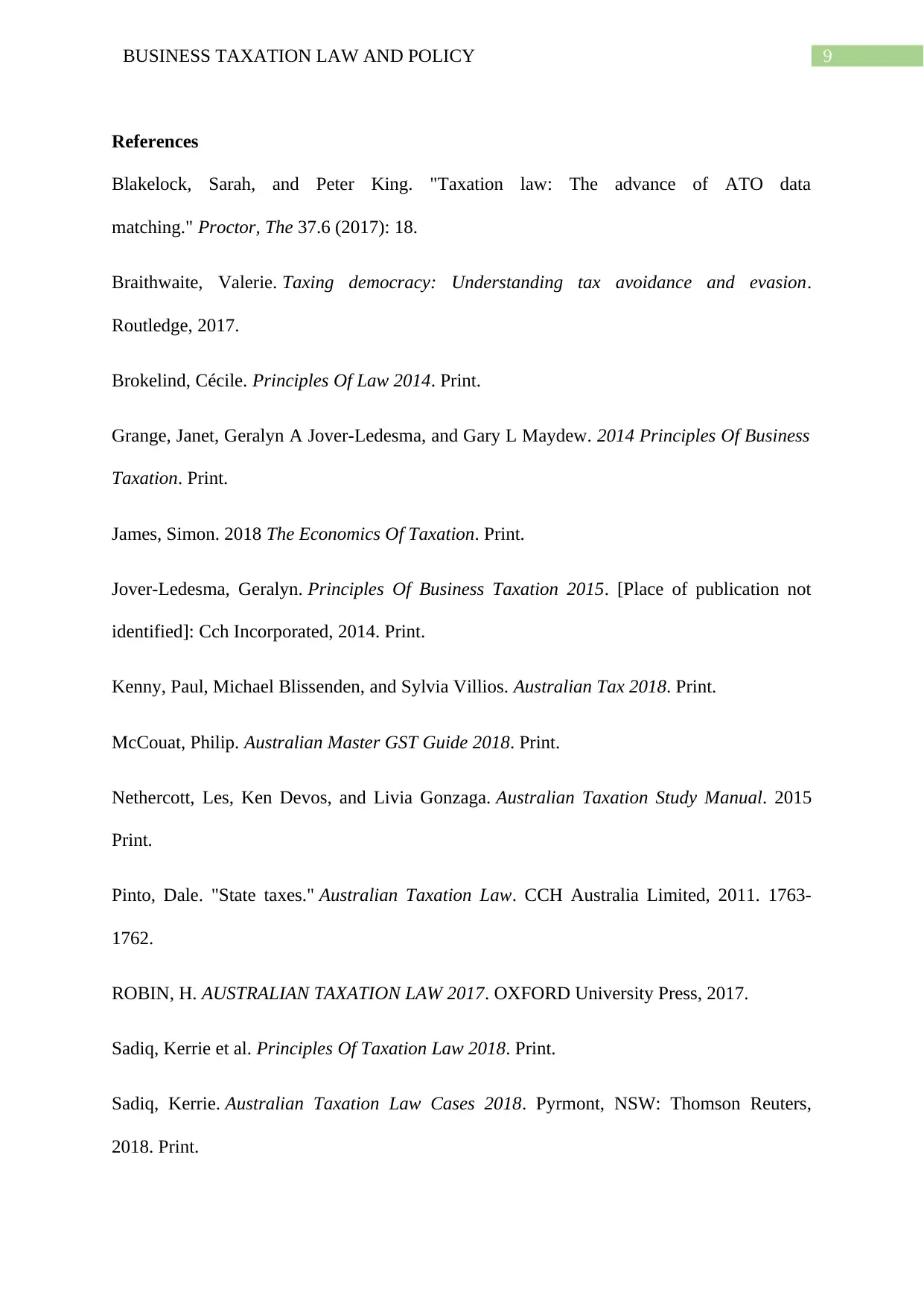
9BUSINESS TAXATION LAW AND POLICY
References
Blakelock, Sarah, and Peter King. "Taxation law: The advance of ATO data
matching." Proctor, The 37.6 (2017): 18.
Braithwaite, Valerie. Taxing democracy: Understanding tax avoidance and evasion.
Routledge, 2017.
Brokelind, Cécile. Principles Of Law 2014. Print.
Grange, Janet, Geralyn A Jover-Ledesma, and Gary L Maydew. 2014 Principles Of Business
Taxation. Print.
James, Simon. 2018 The Economics Of Taxation. Print.
Jover-Ledesma, Geralyn. Principles Of Business Taxation 2015. [Place of publication not
identified]: Cch Incorporated, 2014. Print.
Kenny, Paul, Michael Blissenden, and Sylvia Villios. Australian Tax 2018. Print.
McCouat, Philip. Australian Master GST Guide 2018. Print.
Nethercott, Les, Ken Devos, and Livia Gonzaga. Australian Taxation Study Manual. 2015
Print.
Pinto, Dale. "State taxes." Australian Taxation Law. CCH Australia Limited, 2011. 1763-
1762.
ROBIN, H. AUSTRALIAN TAXATION LAW 2017. OXFORD University Press, 2017.
Sadiq, Kerrie et al. Principles Of Taxation Law 2018. Print.
Sadiq, Kerrie. Australian Taxation Law Cases 2018. Pyrmont, NSW: Thomson Reuters,
2018. Print.
References
Blakelock, Sarah, and Peter King. "Taxation law: The advance of ATO data
matching." Proctor, The 37.6 (2017): 18.
Braithwaite, Valerie. Taxing democracy: Understanding tax avoidance and evasion.
Routledge, 2017.
Brokelind, Cécile. Principles Of Law 2014. Print.
Grange, Janet, Geralyn A Jover-Ledesma, and Gary L Maydew. 2014 Principles Of Business
Taxation. Print.
James, Simon. 2018 The Economics Of Taxation. Print.
Jover-Ledesma, Geralyn. Principles Of Business Taxation 2015. [Place of publication not
identified]: Cch Incorporated, 2014. Print.
Kenny, Paul, Michael Blissenden, and Sylvia Villios. Australian Tax 2018. Print.
McCouat, Philip. Australian Master GST Guide 2018. Print.
Nethercott, Les, Ken Devos, and Livia Gonzaga. Australian Taxation Study Manual. 2015
Print.
Pinto, Dale. "State taxes." Australian Taxation Law. CCH Australia Limited, 2011. 1763-
1762.
ROBIN, H. AUSTRALIAN TAXATION LAW 2017. OXFORD University Press, 2017.
Sadiq, Kerrie et al. Principles Of Taxation Law 2018. Print.
Sadiq, Kerrie. Australian Taxation Law Cases 2018. Pyrmont, NSW: Thomson Reuters,
2018. Print.
Secure Best Marks with AI Grader
Need help grading? Try our AI Grader for instant feedback on your assignments.
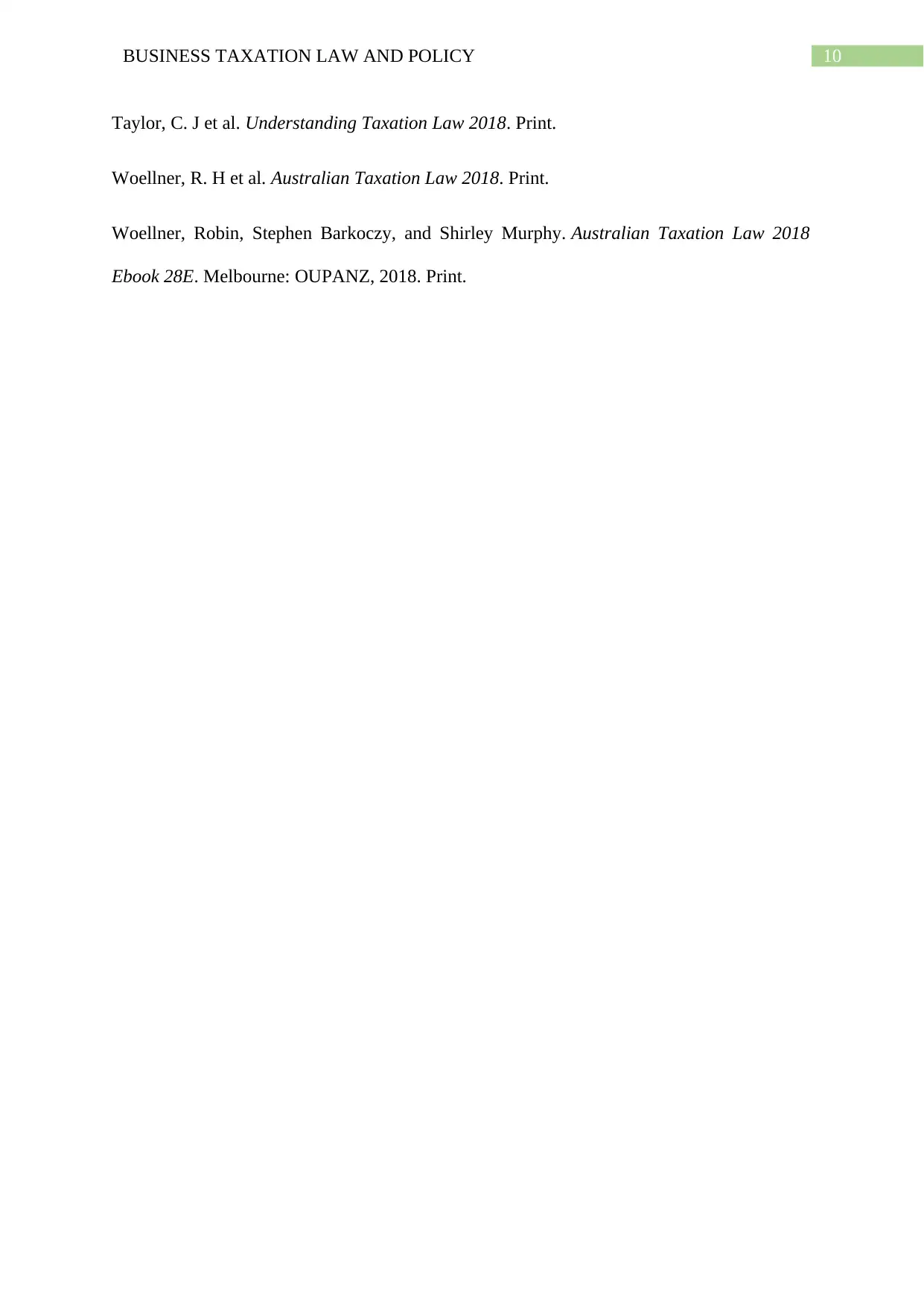
10BUSINESS TAXATION LAW AND POLICY
Taylor, C. J et al. Understanding Taxation Law 2018. Print.
Woellner, R. H et al. Australian Taxation Law 2018. Print.
Woellner, Robin, Stephen Barkoczy, and Shirley Murphy. Australian Taxation Law 2018
Ebook 28E. Melbourne: OUPANZ, 2018. Print.
Taylor, C. J et al. Understanding Taxation Law 2018. Print.
Woellner, R. H et al. Australian Taxation Law 2018. Print.
Woellner, Robin, Stephen Barkoczy, and Shirley Murphy. Australian Taxation Law 2018
Ebook 28E. Melbourne: OUPANZ, 2018. Print.
1 out of 11
Related Documents
Your All-in-One AI-Powered Toolkit for Academic Success.
+13062052269
info@desklib.com
Available 24*7 on WhatsApp / Email
![[object Object]](/_next/static/media/star-bottom.7253800d.svg)
Unlock your academic potential
© 2024 | Zucol Services PVT LTD | All rights reserved.




